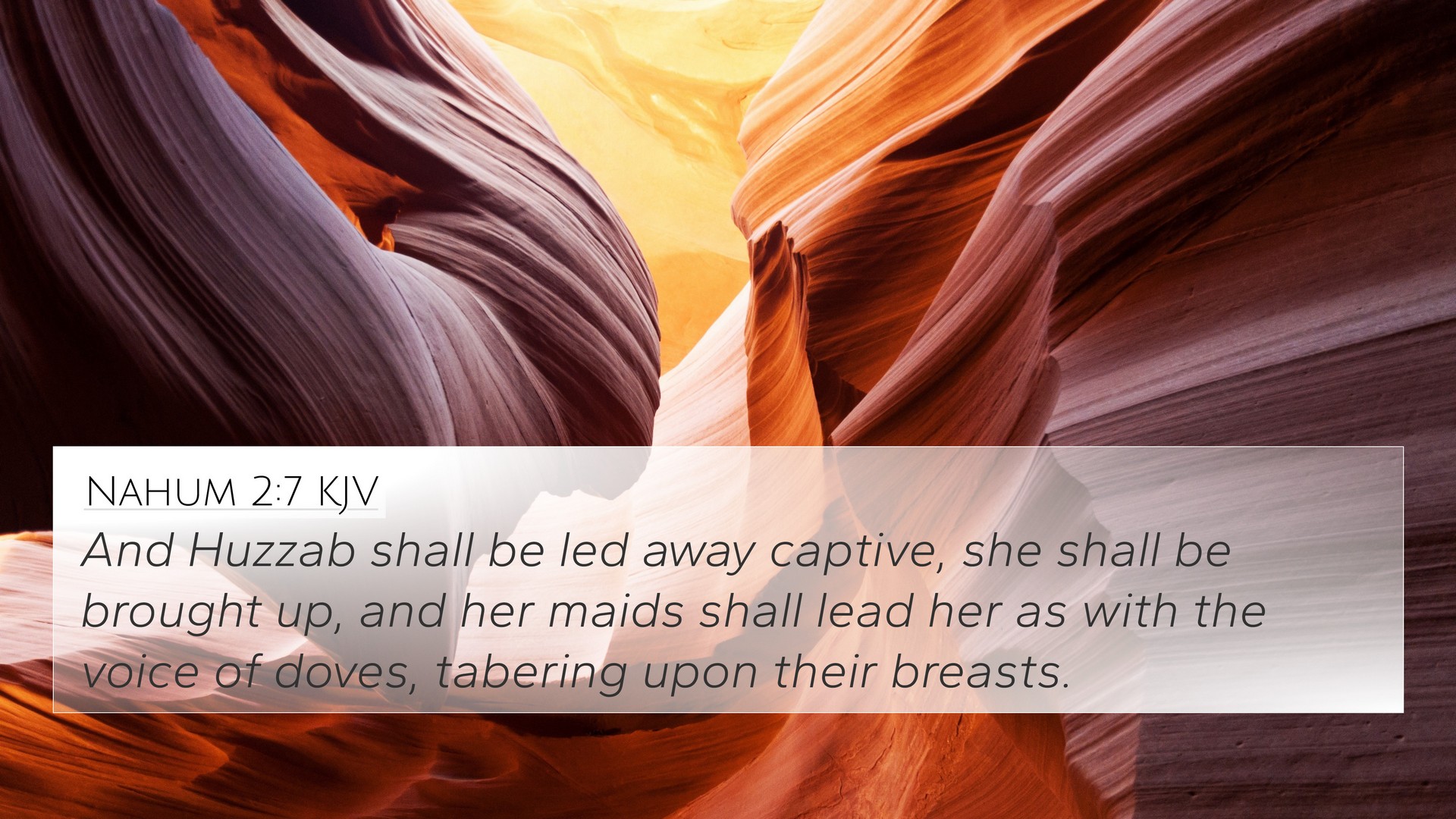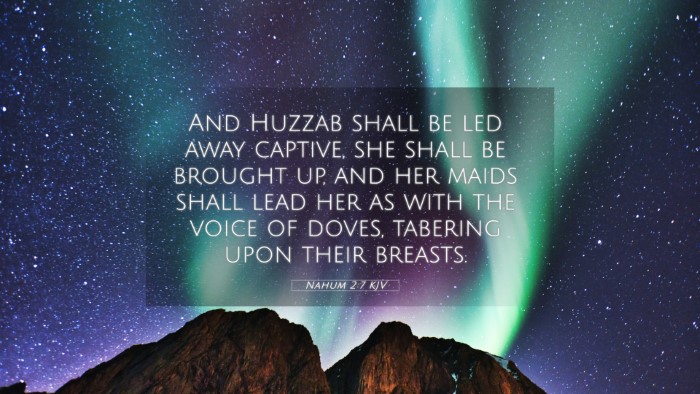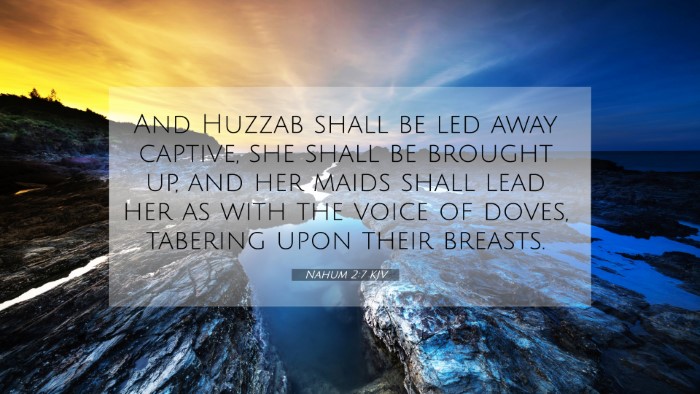Old Testament
Genesis Exodus Leviticus Numbers Deuteronomy Joshua Judges Ruth 1 Samuel 2 Samuel 1 Kings 2 Kings 1 Chronicles 2 Chronicles Ezra Nehemiah Esther Job Psalms Proverbs Ecclesiastes Song of Solomon Isaiah Jeremiah Lamentations Ezekiel Daniel Hosea Joel Amos Obadiah Jonah Micah Nahum Habakkuk Zephaniah Haggai Zechariah MalachiNahum 2:7 Similar Verses
Nahum 2:7 Cross References
And Huzzab shall be led away captive, she shall be brought up, and her maids shall lead her as with the voice of doves, tabering upon their breasts.
Uncover the Rich Themes and Topics of This Bible Verse
Listed below are the Bible themes associated with Nahum 2:7. We invite you to explore each theme to gain deeper insights into the Scriptures.
Nahum 2:7 Cross Reference Verses
This section features a detailed cross-reference designed to enrich your understanding of the Scriptures. Below, you will find carefully selected verses that echo the themes and teachings related to Nahum 2:7 KJV. Click on any image to explore detailed analyses of related Bible verses and uncover deeper theological insights.
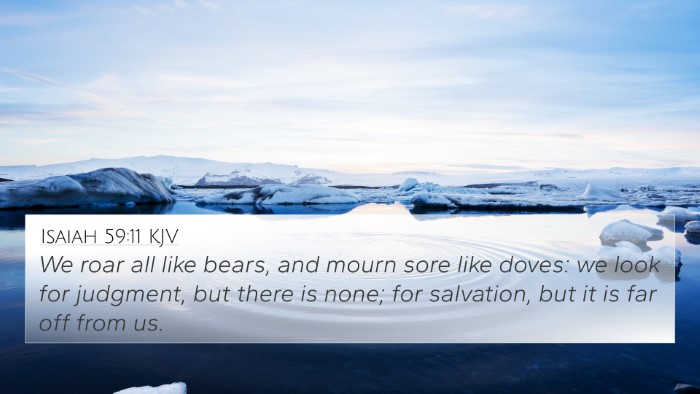
Isaiah 59:11 (KJV) »
We roar all like bears, and mourn sore like doves: we look for judgment, but there is none; for salvation, but it is far off from us.
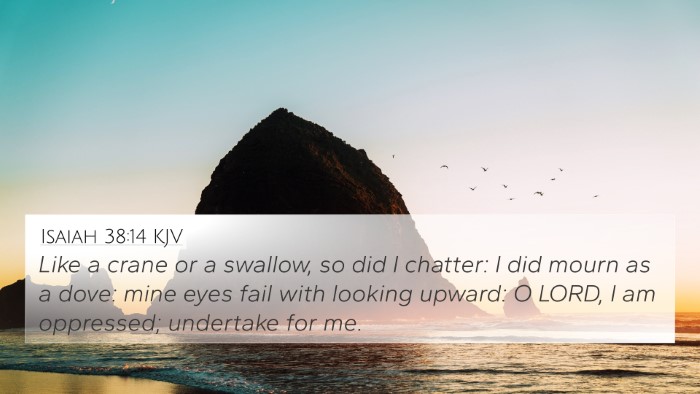
Isaiah 38:14 (KJV) »
Like a crane or a swallow, so did I chatter: I did mourn as a dove: mine eyes fail with looking upward: O LORD, I am oppressed; undertake for me.

Isaiah 32:12 (KJV) »
They shall lament for the teats, for the pleasant fields, for the fruitful vine.

Luke 23:48 (KJV) »
And all the people that came together to that sight, beholding the things which were done, smote their breasts, and returned.

Luke 23:27 (KJV) »
And there followed him a great company of people, and of women, which also bewailed and lamented him.
Nahum 2:7 Verse Analysis and Similar Verses
Nahum 2:7 - Summary and Interpretation
Bible Verse: "And Huzzab shall be led away captive, she shall be brought up, and her maids shall lead her as with the voice of doves, tabering upon their breasts." - Nahum 2:7
Overview
Nahum 2:7 occurs within the context of prophetic pronouncement against Nineveh, the capital of Assyria, known for its cruelty and idol worship. This verse signifies the impending doom of the city, portraying the humiliation and downfall of its leadership and populace.
Commentary Insights
- Matthew Henry: Matthew Henry describes this verse as a depiction of the degradation that the proud and powerful city of Nineveh will face. The mention of "Huzzab" symbolizes the queen or royal figure of Nineveh who will be captured, illustrating that even those of high status will not escape God's judgment.
- Albert Barnes: Barnes elaborates on the term "Huzzab," interpreting it as a proper name representing the city itself or its inhabitants. The verse illustrates the sorrow and lamentation of the captives, as the sound of doves’ cooing reflects mourning and despair over the city's destruction.
- Adam Clarke: Clarke offers insight into the cultural context, explaining that the imagery of "doves" and "tabering" alludes to mourning rituals prevalent among the Israelites. This biblical text serves as a warning unraveling the fall of an empire because of its unrepentant wickedness.
Meaning and Interpretation
The verse serves as a critical lesson in understanding divine justice and the themes of repentance and judgment. The imagery conveys that both societal elites and everyday citizens are subject to God's authority, reflecting a broader biblical truth about leadership and moral responsibility.
Themes Present in Nahum 2:7
- The inevitability of divine judgment against nations
- The vulnerability of power and status in the face of God's will
- The reaction of the people facing judgment, marked by grief and despair
- The consequences of idolatry and sinfulness within a nation
- The role of prophetic voices in warning against corruption
Bible Cross References
Connections to other scriptures that echo the themes found in Nahum 2:7 include:
- Isaiah 10:5-19: God's used Assyria as a tool for judgment.
- Jeremiah 50:39-40: Prophetic warning of judgment on the great city.
- Ezekiel 32:18-28: Describes the fate of mighty nations.
- Zephaniah 2:13-15: The destruction of nations that defy God.
- Habakkuk 2:6-8: The fate of those who plunder and oppress others.
- Lamentations 1:1-3: The lamentation over the fallen city of Jerusalem, reflective of mourning themes.
- Matthew 24:21-22: Jesus speaks about the great tribulation, echoing the themes of sorrow and destruction.
Connecting the Themes Across Scriptures
Analyzing these cross-referenced verses enhances understanding of Nahum 2:7's message regarding divine justice and humility. Each scriptural account contributes to the overall understanding of God's dealings with nations and peoples.
Thematic Bible Verse Connections
The themes presented in Nahum 2:7 encourage a deeper study into:
- The fate of oppressive regimes in biblical history.
- The consistency of God's judgment throughout scripture.
- The role of mourning in response to significant loss or judgment.
Conclusion
Nahum 2:7 serves as a profound reminder of the consequences faced by nations that turn from the path of righteousness. By linking this verse with others throughout the Bible, we gain insight into the nature of God’s justice, the inevitability of judgment, and the theme of communal loss in the face of divine wrath. This cross-referencing creates a comprehensive narrative that underscores the importance of turning from sin and the peril of pride in humanity.
Final Thoughts on Cross-Referencing Biblical Texts
The tools for Bible cross-referencing allow believers to identify connections between the Old and New Testament further, contemplating how prophetic words fulfill within New Testament teachings. Such study not only enhances biblical literacy but also enriches personal faith through a deeper understanding of scripture’s overarching narrative.
